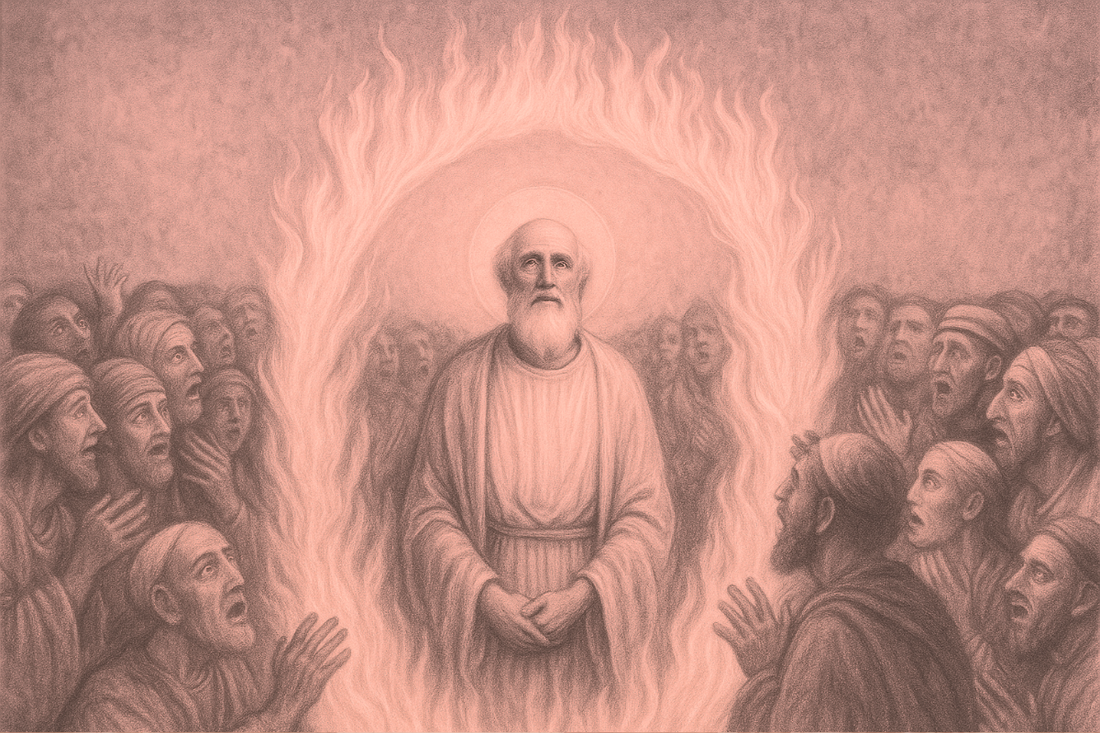
Enduring Tribulation: The Last Days Example of Polycarp
Share
“Be faithful unto death, and I will give you the crown of life.” (Revelation 2:10)
The world is rushing toward the fire.
Tribulation is not far off — it’s almost here, its just starting to physically fall into place very soon. And yet, for the saints of God, fear must bow before faith. If we want to know how to stand when the storm of persecution hits, we need to look back at those who faced the flames before us. Few shine brighter than Polycarp, the aged bishop of Smyrna, a disciple of the apostle John — and a martyr who faced death with unshakable courage.
When the proconsul threatened him with fire, Polycarp didn’t flinch. His words thunder through history:
“You threaten with fire that burns for an hour then soon is extinguished, for you do not know about the coming judgment and the eternal punishment reserved for the ungodly. So why do you delay? Bring on what you want.”
This is the voice of a man whose eyes were not on this world. A man who measured Rome’s flames against God’s eternity and laughed at their weakness.
The Prayer of a Martyr
Before the executioners set the fire, Polycarp lifted his gaze to heaven and prayed:
“Lord God Almighty… I bless you because you have counted me worthy of this day and hour, to take a place among the number of the martyrs in the cup of your Christ, to the resurrection of eternal life… May I be received among them in your presence today as a rich and acceptable sacrifice… I bless you, I glorify you, through the eternal and heavenly high priest, Jesus Christ, your beloved Son… be glory both now and in the ages to come. Amen.”
He didn’t beg for his life. He didn’t ask for escape. He thanked God for being counted worthy to suffer for Christ. This is the posture we must have in the last days — surrender that sees tribulation not as tragedy, but as testimony.
The Miracle in the Flames
Then came the fire. But God wasn’t finished.
“When he had offered up the ‘Amen’ and finished the prayer, the men attending to the fire lit it. As the great flame blazed we saw a miracle (that is, we to whom it was given to see). We have been preserved so that we can relate to others what happened. For the fire took the shape of an arch, like the sail of a ship filled by the wind, encircling the body of the martyr. He was there in the center of it, not like burning flesh, but like baking bread or like gold and silver being refined in a furnace. For we perceived such a sweet aroma like the smell of incense or some other precious spice.”
What the enemy meant for destruction became a testimony of glory. The fire wrapped around him like a shield. His body became like bread offered to God. His death smelled sweeter than life itself. Even in martyrdom, Polycarp became a living offering, a picture of Christ.
And when the flames could not consume him, the lawless men drove in a dagger:
“When he did this, a dove along with a large quantity of blood came out, so that the fire was extinguished. The entire crowd was astonished that there would be such a difference between unbelievers and the elect.”
The fire bowed. The blood quenched the flames. The dove — symbol of the Spirit — bore witness. The world saw with their own eyes that the elect of God are not like the rest of mankind.
What We Must Learn for the Last Days
Polycarp’s testimony is not just history. It is a prophetic call for us who live in the end times. Here is how we endure tribulation as he did:
1. See the fire as temporary. Polycarp reminded his captors that their fire lasted only an hour. Whatever the Antichrist unleashes in the last days, it cannot compare to the eternal fire of God’s judgment — nor to the eternal life promised to us.
2. Offer yourself as a sacrifice. He prayed, “I bless you because you have counted me worthy of this day and hour.” Don’t run from the cost of discipleship. Suffering for Christ is a gift — a chance to be united with Him in His death.
3. Trust God to transform suffering into testimony. The fire didn’t destroy Polycarp — it revealed him. Like gold in a furnace, tribulation refines us into something that bears the reflection of Christ.
4. Expect God’s presence in the trial. The arch of fire, the aroma of incense, the dove from the wound — these signs were God’s way of declaring: “My Spirit is with my servant, even in the flames.” When your time of testing comes, you will not be alone.
5. Do not fear temporary fire. Whatever persecution may come — whether ridicule, imprisonment, or even death — it cannot compare to the eternal hope we have in Christ.
6. Stand with courage and joy. Like Polycarp, our witness to the world comes not through fear, but through fearless faith. The darker the times, the brighter the light of the saints must shine.
7. See tribulation as a privilege. To suffer for Christ is to share in His cup. It is an honor to be counted worthy to bear His name before the world.
8. Fix your eyes on the resurrection. Polycarp endured because he believed in the incorruptibility of the soul and body through Jesus Christ. So must we.
9. Remember the difference between the elect and the unbelievers. The world trembled because they saw the contrast. Tribulation will expose what we really believe. If Christ is in us, even our death will declare His glory.
Final Encouragement
Saints, we were not promised escape from tribulation — but we were promised victory through it. Polycarp’s story reminds us that the only fire we should fear is the one that awaits the ungodly. Our fire — the fire of persecution — lasts but a moment, and then comes the resurrection.
Let us fix our eyes where Polycarp fixed his: on Christ, the eternal High Priest, who Himself endured the cross, despising its shame, and is now seated at the right hand of the throne of God.
And when the hour of testing comes for us, may we, like him, be able to say with courage and joy:
“Bring on what you want.”
